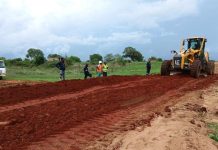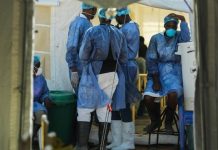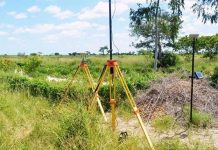Africa-Press – Mozambique. Michafutene Cemetery in Maputo is again busy as a result of the increase in the number of Covid-19 deaths, with gravediggers carrying out between three and four burials a day, in addition to digging a further ten graves.
When the Covid-19 pandemic reached Mozambique, it was expected that the situation would be brought under control in two months, but as time passed this proved to be far from the case. In May 2020, the country registered its first Covid-19 death – of a 13-year-old child in the province of Nampula. In the same month, the Ministry of Health announced another death, this time in Cabo Delgado.
The number of deaths has now risen to 940, with 56 in the first seven days of July alone. Of that total, at least 400 have been buried in Michafutene cemetery in Maputo.
Eugenia Francisco walks with heavy steps to the grave of her 35-year-old son, a father of 10 who died of Covid-19 on Saturday, and whose funeral took place this Tuesday. Heartbroken, she says that Covid-19 killed her son so quickly that they didn’t even have time to say goodbye.
“They took my son and wrapped him in the sheet, then they put him in plastic and put him in the coffin and we buried him without a wake, us being only ten people. It hurts a lot. That’s why I didn’t wait for the eighth day, and came today to be able to spend this time with him,” the bereaved mother laments.
In Michafutene Cemetery, the story repeats and repeats itself. In the left hand corner is the space reserved for Covid-19 deaths – the first victim’s grave is there, as it has since November, 2020. But eight months later, it is almost lost in the midst of so many others.
According to cemetery administrator Alfredo Faife, 10 hectares have been set aside for the burial of those who fall to the coronavirus.
“We have space equivalent to five football fields and, so far, we have used about two or three hectares. Because of the avalanche of cases, we are removing the grass and the gravediggers are digging more graves,” he details.
The cemetery has ten gravediggers who work from 7:00 a.m. to 5:00 p.m. every day, averaging about ten graves, Faife explains.
“Two gravediggers work on each grave, leaving them in reserve so that when the casket arrives, the family members don’t take too long. They can only stay between 15 to 20 minutes,” he notes.
While the ‘O País’ team was on site, three hearses arrived – already three of the average three to four Covid-19 victims buried there every day.
João Alberto is a gravedigger who, by an irony of fate, started to work in February, at the height of the pandemic. He says that at the time, there were days when he helped bury up to ten people.
“This disease is serious. In February, I saw sights I couldn’t have imagined. At first I was afraid, and I still am, but I can’t run away, this is my job,” he says.
Alberto observes that personnel have to be properly attired when carrying out the burial of Covid-19 victims, which to some extent mitigates their fear of contracting the disease.
By
Julieta Zucula






